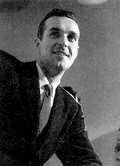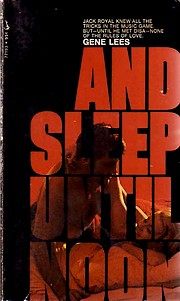 Gene Lees, one of the finest jazz writers ever, passed away a few days ago. Without a doubt, his best work was the series of jazz portraits and memoirs he published in his long-running journal, Jazzletter, which were collected in such books as Cats of Any Color and Meet Me at Jim & Andy’s. He was also a fine lyricist, best known perhaps for his English version of Antonio Carlos Jobim’s “Corcovado,” which Lees transformed into the lovely “Quiet Nights of Quiet Stars.”
Gene Lees, one of the finest jazz writers ever, passed away a few days ago. Without a doubt, his best work was the series of jazz portraits and memoirs he published in his long-running journal, Jazzletter, which were collected in such books as Cats of Any Color and Meet Me at Jim & Andy’s. He was also a fine lyricist, best known perhaps for his English version of Antonio Carlos Jobim’s “Corcovado,” which Lees transformed into the lovely “Quiet Nights of Quiet Stars.”
But Lee also made two ventures into fiction. Late in his life, he published the nostalgic Song Lake Summer, set in upstate New York in the late 19th century, which received generally positive reviews. His first book, And Sleep Until Noon, his first novel, did not.
Lees started writing And Sleep Until Noon in the late 1950s, but only got the book published in 1966.

The book focuses on Jack Royal, a kid from Chicago who evolves from student of classical piano to jazz musician to jazz singer to pop star to star of baguette Westerns and adventure movies. Lees portrays Jack as a talented jerk, the kind of temperamental celebrity who tries to get hotel managers fired when the wrong drink shows up on his room service cart. Jack’s life and ways are turned around in the course of a week or so in Stockholm when he meets a beautiful journalist, Disa Lindahl. Unlike Jack, Disa is true-hearted and pure in spirit. Her effect on Jack is like that of a tuning fork, putting his mind and life back to the right pitch, and even though they go their separate ways in the end, it’s clear that Jack will now take his work, art, and other people seriously.
If that plot sounds thin, Lees’ characterizations do little to compensate. He attempts to draw some kind of parallel between Jack’s meandering career, marked mostly by a series of self-indulgent decisions, and that of Bud Weston, Jack’s boyhood friend, who drops jazz for medicine after meeting–and falling in love with–a Costa Rican prostitute scarred in an auto accident. As young men, both Bud and Jack are liberal users of booze, pot, and women, and there are numerous accounts of their debauches, none of them particularly convincing. Jack postulates at one point that “an entertainer’s popularity with women, who formed the majority of his audience and determined the tastes of the rest of it, varied directly with his utility as a focus for sexual fantasies, and any one of them who thought otherwise was a damn fool.”Library Journal called the book “sophomoric with puerile gaps predominating in the earlier parts.” I’m guessing the Journal’s critic was thinking of the scene where Bud masturbates a horse with a violin bow.
As a lyricist, Lees’ writing could be subtle and poetic. As a budding novelist, his work was on a par with those tired old lines about how the love of a good woman’ll set a man straight.
The only bright spots in the book are a few passages where Lees gets down to his true passion, music. There’s a wonderful little essay toward the end about the art of the pop singer, particularly on record:
Recording was an intimate medium. The listener’s ear was brought to a distance of only inches from the singer’s mouth. It was not only unnecessary to shout; it was rude. Making it even more intimate was the fact that the record was usually heard by one person, sometimes two, rarely as many as three at a time. If there were more persons present, he was fond of saying, nobody was listening–they were too busy talking.
And so, in recent years, there had been a steady evolution of his conception. He had dropped the volume of his voice. Not that he had abandoned the use of dynamics; he had simply made them more subtle. As a result his records had an arresting quality of intimacy, of private urgency, and a woman who listened to them tended to be drawn into the illusion that he was singing directly to her; while men, oddly enough, were inclined to feel that he was speaking on their behalf, saying those thing, making those confessions that they would make themselves were they only eloquent enough ….
Lees himself later told an interviewer that he hated the book. Perhaps the kindest thing one can says about it is that it provides convincing evidence that Lees made the right decision when he abandoned fiction and concentrated instead on writing about what he knew and loved best: jazz, pop, and the remarkable musicians who play it.

Thanks for starting & maintaining such an interesting site. I’ve literally spent hours combing through it, finding forgotten books I’m now anxious to hunt down & read. “And Sleep Till Noon” may not be one of them, although the passage you quote from Lees re: the art of the pop singer is truly a great piece of writing. The second paragraph could serve as a fine description of Frank Sinatra’s style during his “golden period” on Capitol Records during the 1950s.
Thanks for the note. Gene was certainly a giant among jazz writers, particularly for being in the midst of the business rather than a bystander.
Great site – I somehow have a copy of And Sleep Until Noon, signed by Lees to my inlaws. Perhaps it’s collectible since his death. My inlaws knew everybody in the jazz world! found books inscribed to them by W.C. Handy, Sammy Cahn…..very interesting
For those of us who spend their lives attempting to reinvigorate those heady, jazzy days of the 1950’s – 1960’s in the up and coming musicians, Gene Lees is one hell of an example of how cool Jazz can be.
Jazz Rocks !
Cheers
Col :-)
Thanks for the nice compliment, Mark. I hope you’ll pass along your own neglected favorites sometime. Wander around the site and find a few dozen reasons to put off reading anything that’s in print today.
I tend to keep my nose stuck in books that are at least 60 years old. I stumbled across the site when I was looking for some info on my one of my favorite neglected authors, Davis Grubb. I am totally wowed by the posts I have read. It looks I will not get around to reading Infinite Jest until I’m 65 – there is so much that has come before that deserves sometime in front of my eyeballs. Wonderful site!!